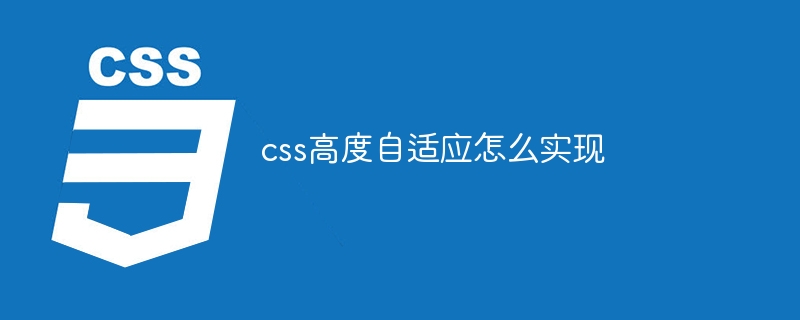How to achieve CSS height adaptability
CSS methods to achieve adaptive height include: using a flexbox container and setting its height to auto. Use grid layout and set its height to auto. Combine percentage and min-height to achieve adaptation based on a fixed minimum height. Automatically adjusts to the browser's window height using VH units.

CSS height adaptive implementation method
There are many ways to achieve height adaptability in CSS. Here are some common methods: :
1. Using flexbox containers
Flexbox layout is a modern layout system that allows elements to be flexibly arranged along the main and cross axes. To use flexbox to achieve adaptive height, you can set the container to a flexbox container and set its height to auto. Elements within the container will automatically adjust their height based on their content.
Code Example:
.container {
display: flex; /* 设置为flexbox容器 */
flex-direction: column; /* 元素沿列方向排列 */
height: auto; /* 高度自动调整 */
}2. Using grid layout
Grid layout is another modern layout system that allows the creation of more complex grids layout. To use grid layout to achieve height adaptability, you can set the container to a grid container and set its height to auto. Elements within the container will automatically adjust their height based on their content.
Code example:
.container {
display: grid; /* 设置为grid容器 */
grid-template-columns: 1fr; /* 创建一列 */
height: auto; /* 高度自动调整 */
}3. Combine percentage and min-height
If you need to implement adaptive height based on a fixed minimum height, You can use percentages and min-height. Set the container's height as a percentage and its min-height to the required minimum height. The height of the container will automatically adjust based on the height of its parent element, but will not be lower than min-height.
Code example:
.container {
height: 100%; /* 根据父元素高度调整 */
min-height: 200px; /* 最小高度 */
}4. Using VH units
VH units refer to the percentage of the viewport height. To achieve height adaption using VH units, you can set the height of the container to 100vh. The container's height will automatically adjust based on the browser's window height.
Code example:
.container {
height: 100vh; /* 100%视口高度 */
}The above is the detailed content of How to achieve CSS height adaptability. For more information, please follow other related articles on the PHP Chinese website!

Hot AI Tools

Undresser.AI Undress
AI-powered app for creating realistic nude photos

AI Clothes Remover
Online AI tool for removing clothes from photos.

Undress AI Tool
Undress images for free

Clothoff.io
AI clothes remover

Video Face Swap
Swap faces in any video effortlessly with our completely free AI face swap tool!

Hot Article

Hot Tools

Notepad++7.3.1
Easy-to-use and free code editor

SublimeText3 Chinese version
Chinese version, very easy to use

Zend Studio 13.0.1
Powerful PHP integrated development environment

Dreamweaver CS6
Visual web development tools

SublimeText3 Mac version
God-level code editing software (SublimeText3)

Hot Topics
 How to use bootstrap in vue
Apr 07, 2025 pm 11:33 PM
How to use bootstrap in vue
Apr 07, 2025 pm 11:33 PM
Using Bootstrap in Vue.js is divided into five steps: Install Bootstrap. Import Bootstrap in main.js. Use the Bootstrap component directly in the template. Optional: Custom style. Optional: Use plug-ins.
 The Roles of HTML, CSS, and JavaScript: Core Responsibilities
Apr 08, 2025 pm 07:05 PM
The Roles of HTML, CSS, and JavaScript: Core Responsibilities
Apr 08, 2025 pm 07:05 PM
HTML defines the web structure, CSS is responsible for style and layout, and JavaScript gives dynamic interaction. The three perform their duties in web development and jointly build a colorful website.
 Understanding HTML, CSS, and JavaScript: A Beginner's Guide
Apr 12, 2025 am 12:02 AM
Understanding HTML, CSS, and JavaScript: A Beginner's Guide
Apr 12, 2025 am 12:02 AM
WebdevelopmentreliesonHTML,CSS,andJavaScript:1)HTMLstructurescontent,2)CSSstylesit,and3)JavaScriptaddsinteractivity,formingthebasisofmodernwebexperiences.
 How to write split lines on bootstrap
Apr 07, 2025 pm 03:12 PM
How to write split lines on bootstrap
Apr 07, 2025 pm 03:12 PM
There are two ways to create a Bootstrap split line: using the tag, which creates a horizontal split line. Use the CSS border property to create custom style split lines.
 How to set up the framework for bootstrap
Apr 07, 2025 pm 03:27 PM
How to set up the framework for bootstrap
Apr 07, 2025 pm 03:27 PM
To set up the Bootstrap framework, you need to follow these steps: 1. Reference the Bootstrap file via CDN; 2. Download and host the file on your own server; 3. Include the Bootstrap file in HTML; 4. Compile Sass/Less as needed; 5. Import a custom file (optional). Once setup is complete, you can use Bootstrap's grid systems, components, and styles to create responsive websites and applications.
 How to insert pictures on bootstrap
Apr 07, 2025 pm 03:30 PM
How to insert pictures on bootstrap
Apr 07, 2025 pm 03:30 PM
There are several ways to insert images in Bootstrap: insert images directly, using the HTML img tag. With the Bootstrap image component, you can provide responsive images and more styles. Set the image size, use the img-fluid class to make the image adaptable. Set the border, using the img-bordered class. Set the rounded corners and use the img-rounded class. Set the shadow, use the shadow class. Resize and position the image, using CSS style. Using the background image, use the background-image CSS property.
 How to use bootstrap button
Apr 07, 2025 pm 03:09 PM
How to use bootstrap button
Apr 07, 2025 pm 03:09 PM
How to use the Bootstrap button? Introduce Bootstrap CSS to create button elements and add Bootstrap button class to add button text
 How to resize bootstrap
Apr 07, 2025 pm 03:18 PM
How to resize bootstrap
Apr 07, 2025 pm 03:18 PM
To adjust the size of elements in Bootstrap, you can use the dimension class, which includes: adjusting width: .col-, .w-, .mw-adjust height: .h-, .min-h-, .max-h-






